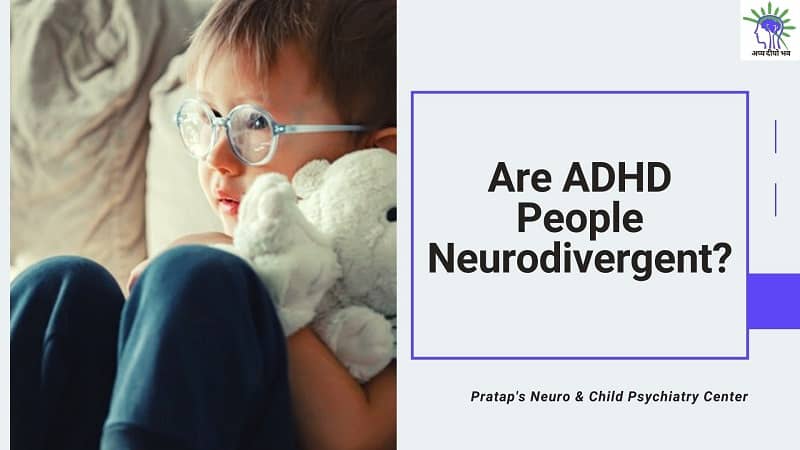
21 May Confused on Whether suffering from ADHD, Neurodivergency or Both? Contact Dr. Vivek Pratap Singh!!
Are ADHD people neurodivergent? This is like a very common question asked by people who face problems like ADHD. However, you might also be one of them.
ADHD is not yet identified as a pure disease with causes, but with numerous research by many doctors, it is said to be caused genetically or by birth itself.
However, if you are wondering about thoughts like ‘am I neurodivergent’, then you visited the perfect blog to help you find your answers.
ADHD Meaning
Inattentiveness, hyperactivity, and impulsiveness are among the behavioral signs of attention deficit hyperactivity disorder (ADHD). It is one of several neurodiverse disorders, including dyspraxia, dyslexia, and autism, especially Asperger’s syndrome.
Currently, symptoms of ADHD are often observed at a young age, and children as young as 6 to 12 years old can be diagnosed. But, however, this is not always the case, and there are many people like you who would not have been diagnosed in their adolescence due to a lack of knowledge and the ability to be diagnosed at the time.
However, if you are feeling uncomfortable to ask anyone from help on ADHD meaning or cannot handle your ADHD level, then you should definitely look for a guidance. One such excellent recommendation is Dr. Vivek Pratap Singh, best Psychiatrist in Patna. He has guided and helped many of his ADHD patients to live a normal life with the problem itself.
But, still that main question that needs to be answered is Are ADHD people neurodivergent? Or is add neurodivergent?
Are ADHD People Neurodivergent?
The causes of ADHD are still a mystery. ADHD is recognized to be neurodevelopmental, which means it is caused by the way a person’s brain and nervous system develop during their childhood. It is also largely hereditary and commonly runs in families.
ADHD symptoms can improve with age, especially if symptoms are treated early in life so that the developing mind can form habits and routines that will help lessen the consequences later.
Therefore, to answer your question on ‘Are ADHD people neurodivergent’, I hope you got the point. However, most of the cases proved to be as said. But, there are very rarest cases where this particular statement could be denied.
What is Considered Neurodivergent?
There is no genuine ‘normal’ state of mind to compare neurodevelopmental problems to, making treatment more challenging because it is difficult to establish when someone is treated. Its symptoms, behaviors, and characteristics are the result of a person’s brain growing differently before birth or as a very young kid through important phases of development.
This is distinct from mental illness, which refers to patterns of behavior in which a person has a different ‘state of mind’ than their ‘normal self.’ However, this state of you can be caused due to the reasons like- Genetics, prenatal trauma, infectious disease, immune diseases, nutritional issues, and physical trauma are all considerations to consider.
Neurodivergent ADHD Symptoms
The following are common childhood manifestations of ADHD’s fundamental characteristics:
- Distraction: They are easily distracted, have weak focus skills, and have trouble organizing themselves.
- Impatience, risk-taking, and overly emotional responses are all examples of impulsivity.
- Hyperactivity: extreme energy, talkativeness, excessive fidgeting, inability to stay on task
Because everyone is different, it’s not rare for two people to have ADHD in very different ways. Males exhibit high degrees of evident physical hyperactivity, whereas females may appear to be the polar opposite, quiet and inattentive due to mental hyperactivity resulting in excessive daydreaming.
Is Bipolar Neurodivergent?
Other disorders like schizophrenia, OCD, borderline personality disorder, dissociative disorder, and bipolar disorder can also be classified as neurodivergence.
There are two or more neurodivergent categories/labels that an individual can have (e.g., autism and ADHD, dyslexia and dyspraxia etc.). Multiply neurodivergent persons are referred to as such, and this is a regular occurrence among neurodivergent persons.
So, yes there can be two labels i.e. neurodivergent and bipolarity in you at the same time. However, better diagnosis, you should take a good analysis by a renowned Neuropsychiatrist in Patna, Dr. Vivek Pratap Singh.
Is ADHD Neurotypical?
To answer your question, no, ADHD is not neurotypical. By definition, neurotypical refers to a person’s average or typical neurology, which is the most frequent in the human species.
ADHD is a neurodevelopmental disorder with a deviation from the norm, making it non-neurotypical. Neurodivergent neurotypes, such as ADHD, are atypical neurotypes.
Neurodivergent ADHD Test
To test whether you are neurodivergent or not, you can go through simple quizzes or assessments under some psychiatrist or a Neuropsychiatrist. This will help in overall assessment of you being one of the ADHD person or not. However, with such diagnosis, you need should be checkup in good hands.
Therefore, Dr. Vivek Pratap Singh provides you the best ADHD Treatment in Patna. He has treated a large number of neuropsychiatric patients, with a very low risk of problems.
He also helps with the post-treatment period, which leads to a successful recovery. Dr. Vivek Pratap’s Neuro and Child Psychiatry Clinic is regarded for offering the best neuropsychiatric treatment available.
He is currently employed as a psychiatrist at PMCH. With his ten years of medical successes, the PMCH psychiatric department is extremely blessed.
Neuropsychiatric illnesses are difficult to understand. Treatment for these problems should not be put off. We strongly advise you to seek the services of Dr. Vivek Pratap Singh, the greatest Neuropsychiatrist in Patna. You may rest assured that you will be safe with us.
However, if you still have any query on Are ADHD people neurodivergent’, write us in the comment box below!!

No Comments